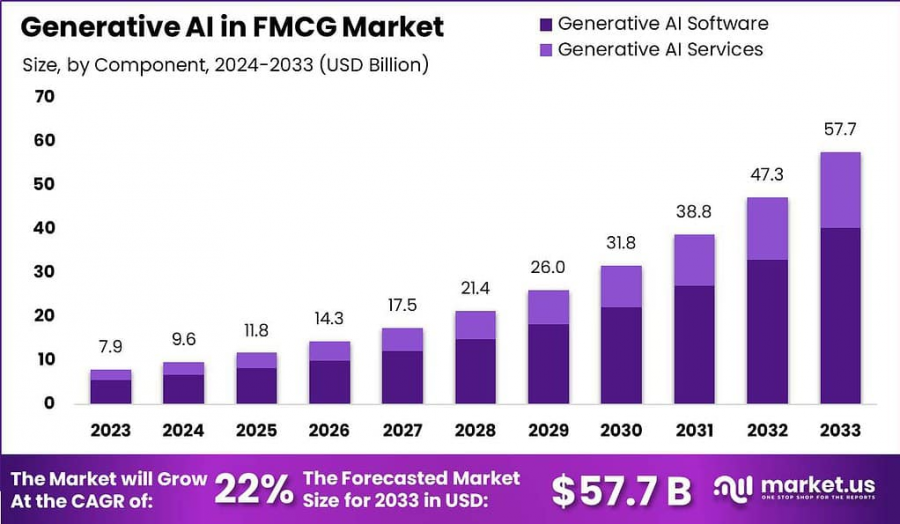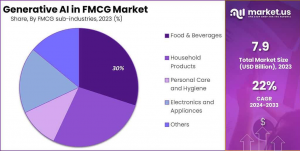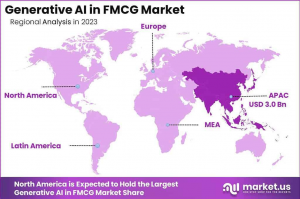
Generative AI in FMCG Market Revenue to Reach USD 57.7 Bn By 2033, Generative AI Software and APAC Dominate
By 2033, the Generative AI in FMCG Market is anticipated to hit USD 57.7 billion, growing at an impressive 22% CAGR over the forecast period.
NEW YORK, NY, UNITED STATES, January 27, 2025 /EINPresswire.com/ -- Generative AI is transforming the fast-moving consumer goods (FMCG) industry by enabling companies to create and optimize products at an unprecedented pace. This technology leverages machine learning models to generate new ideas for products, marketing strategies, and more, based on existing data patterns. It’s like having a highly creative assistant that never runs out of innovative ideas, helping brands stay relevant and competitive in a rapidly changing market.
One of the primary drivers of this market is the need for FMCG companies to enhance efficiency and innovation. Generative AI aids in streamlining supply chains, optimizing inventory, and personalizing marketing to meet the dynamic consumer demands. The technology's ability to analyze vast datasets allows for better demand forecasting and product customization, which are crucial in maintaining competitiveness in the fast-paced FMCG sector
The market is witnessing a trend towards hyper-personalization and sustainable manufacturing. Generative AI is enabling companies to offer customized products and experiences by analyzing consumer behavior and preferences on a granular level. Additionally, AI-driven processes are being utilized to minimize waste and improve resource efficiency, aligning with global sustainability goals.
👉 𝐁𝐮𝐲 𝐍𝐨𝐰 𝐭𝐡𝐢𝐬 𝐏𝐫𝐞𝐦𝐢𝐮𝐦 𝐑𝐞𝐩𝐨𝐫𝐭 𝐭𝐨 𝐆𝐫𝐨𝐰 𝐲𝐨𝐮𝐫 𝐁𝐮𝐬𝐢𝐧𝐞𝐬𝐬: https://market.us/purchase-report/?report_id=120926
There is a growing demand for technologies that can predict consumer trends and streamline operations. FMCG companies are leveraging Generative AI for product innovation, quality control, and predictive maintenance to ensure high standards and operational continuity. These applications not only reduce costs but also enhance product offerings and market responsiveness.
Generative AI presents multiple benefits for various stakeholders in the FMCG market. For businesses, it offers significant cost reductions, increased productivity, and the ability to quickly adapt to market changes. Consumers benefit from enhanced product quality and more tailored shopping experiences. Meanwhile, technology providers gain from the expansion of AI applications in a sector with burgeoning demand.
Key Takeaways
➤ The Generative AI in FMCG market is projected to reach USD 57.7 billion by 2033, growing at a CAGR of 22% from 2024 to 2033.
➤ The Generative AI Software segment dominates the FMCG sector, with significant market share.
➤ The Demand Forecasting segment led the market in 2023, accounting for over 15% of the share.
➤ In 2023, the Food & Beverages segment was the market leader, holding over 30% of the share.
➤ APAC captured the largest share in the Generative AI FMCG sector in 2023, with more than 38% share.
Time to Invest
According to survey, the global generative AI market is on track for extraordinary growth. It is projected to reach USD 255.8 billion by 2033, up from just USD 13.5 billion in 2023, reflecting an impressive CAGR of 34.2% from 2024 to 2033. Generative AI is rapidly becoming a key part of daily life, with 70% of consumers actively seeking AI-powered recommendations for products and services. Adoption varies globally—73% of surveyed Indians already use generative AI, followed by 49% in Australia, 45% in the US, and 29% in the UK.
The technology is especially popular with Millennials and Gen Z. 65% of users belong to these younger demographics, and 72% are employed professionals. Confidence in using the technology is also rising, with nearly 6 in 10 users believing they are mastering it, and 52% of Gen Z trusting AI to guide their decisions. Overall, 52% of users report using generative AI more today than when they started.
Retail is emerging as a major growth area for generative AI. Executives estimate that 36% of employees in the sector are already using it, with this number expected to grow to 45% by 2025. This trend highlights how AI is increasingly integrated into business operations to drive efficiency and innovation.
Analysts’ Viewpoint regarding Generative AI in FMCG
Generative AI is set to revolutionize the Fast-Moving Consumer Goods (FMCG) industry by ushering in a new era of innovation and operational efficiency. Transformative technology enables companies to fine-tune their supply chains, predict consumer demand with unprecedented accuracy, and personalize marketing to an extent previously unattainable. Major brands like Unilever and Coca-Cola are already leveraging AI to analyze complex datasets for deeper consumer insights and more resilient supply chain operations.
However, the investment landscape in generative AI for FMCG is not without risks. The technology's rapid development and application come with challenges such as data privacy concerns, the potential for bias in AI algorithms, and the necessity for significant upfront investment in technology and skills training. Regulatory frameworks are still catching up with these advancements, posing a potential hurdle for widespread adoption. Companies must navigate these issues carefully by investing in robust data security measures and ensuring their AI implementations are both ethical and compliant with emerging regulations.
From an investment standpoint, the opportunities in generative AI for FMCG are vast. As companies strive to remain competitive in a rapidly evolving market, investments in AI technologies can drive significant returns through improved efficiency, reduced costs, and enhanced customer satisfaction. However, investors must also consider the integration complexities and ongoing operational costs associated with these technologies. By balancing the promising advantages with the inherent risks and regulatory challenges, stakeholders can strategically position themselves to capitalize on the generative AI wave sweeping across the FMCG industry.
Impact Of AI
Enhanced Product Development: AI accelerates the innovation cycle within FMCG companies by analyzing vast amounts of data on consumer behavior, market trends, and product performance to streamline product development. For instance, AI has been integral in helping companies like L'Oréal identify and respond to emerging beauty trends rapidly, thus reducing time-to-market for new products.
Supply Chain Optimization: AI improves supply chain efficiency by predicting demand and optimizing stock levels, thus ensuring products are available when and where needed without overstocking. This not only cuts costs but also enhances sustainability by reducing waste.
Personalized Marketing: Through the use of generative AI, companies can create highly customized content that resonates with individual consumer preferences, leading to more effective marketing campaigns. Coca-Cola, for example, has leveraged AI to craft personalized marketing strategies that have significantly enhanced consumer engagement and brand loyalty.
Operational Efficiencies: AI-driven tools automate and optimize operations, from inventory management to predictive maintenance, ensuring high productivity and minimal downtime. This application of AI helps companies manage their resources more effectively, making operations leaner and more responsive to market demands.
Consumer Engagement: Advanced AI technologies, such as chatbots and virtual assistants, offer 24/7 customer service, handling inquiries and providing personalized recommendations. This not only enhances the customer experience but also builds brand loyalty by offering seamless support and interaction.
👉 𝐂𝐥𝐢𝐜𝐤 𝐭𝐨 𝐑𝐞𝐪𝐮𝐞𝐬𝐭 𝐒𝐚𝐦𝐩𝐥𝐞 𝐑𝐞𝐩𝐨𝐫𝐭 𝐚𝐧𝐝 𝐃𝐫𝐢𝐯𝐞 𝐈𝐦𝐩𝐚𝐜𝐭𝐟𝐮𝐥 𝐃𝐞𝐜𝐢𝐬𝐢𝐨𝐧𝐬: https://market.us/report/generative-ai-in-fmcg-market/free-sample/
Regional Analysis
In 2023, the Generative AI market within the Fast-Moving Consumer Goods (FMCG) sector is predominantly led by the Asia-Pacific (APAC) region, which holds a commanding market share of 38%. This region contributes significantly to the market's revenue, generating up to USD 3.0 billion.
This leadership can be attributed to several factors that favor the rapid adoption of AI technologies in APAC. High population density, increasing digital penetration, and robust economic growth in countries like China, India, and Japan provide a fertile ground for AI applications in consumer goods. The region's companies are integrating AI to optimize supply chains, enhance customer service, and innovate product development, thereby driving efficiency and competitiveness.
Furthermore, government initiatives across APAC countries in promoting AI technology through investments and favorable policies have spurred significant growth in this sector. These factors make APAC a critical hub for generative AI advancements, influencing global trends and standards in the FMCG industry. As AI continues to evolve, its impact is expected to expand, potentially increasing the market share and revenue contributions from this region.
Market Segmentation
Component Analysis
In 2023, the Generative AI Software segment was the dominant force within the FMCG market, capturing over 70% of the market share. This remarkable share can be attributed to the increasing adoption of advanced AI technologies across the FMCG sector. Generative AI software enables companies to optimize various processes such as product design, marketing strategies, and content generation. Its ability to create realistic, high-quality content tailored to specific customer segments has proven invaluable.
Application Analysis
The Demand Forecasting segment in the Generative AI for FMCG market captured over 15% of the market share in 2023. Demand forecasting is crucial for FMCG companies as it allows them to predict consumer purchasing patterns, optimize inventory management, and ensure products are available when needed. By leveraging generative AI, companies can improve the accuracy of their demand predictions by analyzing vast datasets, identifying trends, and adjusting for variables such as seasonality and market conditions.
FMCG sub-industries Analysis
The Food & Beverages segment was another key player within the Generative AI market in 2023, capturing more than 30% of the overall market share. This dominance is largely due to the specific demands and challenges faced by the food and beverage industry, which generative AI helps address. AI tools are used for recipe development, optimizing production processes, personalization of marketing campaigns, and enhancing customer engagement.
𝐏𝐮𝐫𝐜𝐡𝐚𝐬𝐞 𝐭𝐡𝐞 𝐑𝐞𝐩𝐨𝐫𝐭 𝐭𝐨 𝐔𝐧𝐜𝐨𝐯𝐞𝐫 𝐊𝐞𝐲 𝐈𝐧𝐬𝐢𝐠𝐡𝐭𝐬: https://market.us/purchase-report/?report_id=120926
Emerging Trends
Personalized Shopping Experiences: Retailers are using generative AI to create tailored shopping experiences. By analyzing customer data, AI helps in offering product recommendations and dynamic content that match individual preferences, enhancing customer satisfaction.
Efficient Order Management: AI streamlines the order life cycle by analyzing data on inventory and demand. This leads to better decision-making, ensuring products are available when and where customers need them.
Innovative Product Development: Companies are leveraging AI to design new products and packaging. By understanding market trends and consumer preferences, AI aids in creating offerings that resonate with customers.
Enhanced Marketing Strategies: Generative AI is transforming advertising by creating personalized content. This approach increases engagement and ensures marketing efforts are more effective.
Sustainable Practices: AI assists FMCG companies in developing sustainable products by innovating with eco-friendly ingredients and processes. This not only meets consumer demand for greener products but also promotes environmental responsibility.
Top Use Cases
Creating New Products Faster: Companies like Mondelez International, known for Oreo cookies, are using AI to develop new snack recipes more quickly. This approach helps them bring products to market up to five times faster than before.
Personalizing Customer Experiences: Wendy's has introduced AI in their drive-thru services to offer personalized ordering experiences. The AI system can take orders in multiple languages, making the process smoother for diverse customers.
Improving Supply Chains: AI helps FMCG companies manage their supply chains better by predicting demand and optimizing inventory. This means products are available when and where customers want them, reducing waste and costs.
Enhancing Marketing Strategies: Brands are using AI to analyze consumer data and create targeted marketing campaigns. This leads to more effective advertising and a better understanding of customer preferences.
Innovating in Product Development: In Milan, gelato makers are using AI to come up with unique flavor combinations, blending traditional craftsmanship with modern technology to delight customers.
Major Challenges
Data Privacy and Security: Handling large volumes of consumer data raises concerns about maintaining privacy and protecting information from breaches. Ensuring compliance with data protection regulations is essential.
Integration with Existing Systems: Incorporating AI into current operations can be complex and resource-intensive. It requires careful planning to ensure new technologies work seamlessly with established processes.
Ethical and Compliance Issues: Generative AI can sometimes produce unintended or biased outputs, leading to ethical dilemmas. Establishing oversight mechanisms is crucial to ensure AI aligns with ethical standards and complies with regulations.
High Implementation Costs: Deploying AI solutions often involves significant financial investment. Companies must weigh these costs against potential benefits and consider starting with small projects to demonstrate value before scaling up.
Maintaining Authenticity in Marketing: AI-generated content can sometimes feel impersonal, lacking the human touch that resonates with consumers. For instance, Coca-Cola faced criticism for an AI-generated holiday advertisement that was perceived as "cold and ineffective." Balancing AI efficiency with genuine human elements is vital.
Market Opportunities for Key Players
Demand Forecasting and Inventory Management: Generative AI significantly enhances demand forecasting by analyzing comprehensive market data, leading to more precise predictions and optimized inventory management. This helps companies like PepsiCo to align their supply with market demands, reduce waste, and improve overall efficiency.
Personalized Marketing: By utilizing generative AI, companies can create marketing campaigns that are highly customized to individual consumer preferences. For instance, Coca-Cola uses generative AI to generate deeply personalized marketing content, improving customer engagement and driving market growth.
Supply Chain Optimization: AI-driven agile supply chains are another major opportunity, where generative AI analyzes patterns and optimizes logistics operations. This enables companies to respond in real-time to market changes and maintain uninterrupted supply flows, as seen in Unilever's approach.
Product Innovation: Generative AI aids in the design and development of new products by incorporating consumer feedback and current trends. This not only speeds up the product development process but also ensures that the products meet the latest consumer expectations effectively.
👉 𝐆𝐞𝐭 𝐚 𝐂𝐨𝐦𝐩𝐥𝐞𝐭𝐞 𝐚𝐧𝐝 𝐏𝐫𝐨𝐟𝐞𝐬𝐬𝐢𝐨𝐧𝐚𝐥 𝐬𝐚𝐦𝐩𝐥𝐞 𝐏𝐃𝐅@ https://market.us/report/generative-ai-in-fmcg-market/free-sample/
Market Companies
- IBM
- Microsoft
- Google Cloud
- Amazon Web Services (AWS)
- SAP
- Oracle
- Accenture
- Capgemini
- SAS
- Alibaba Cloud
- Other key players
Recent Developments
In September 2024: Amazon introduced five new generative AI tools designed to assist sellers in creating product listings more efficiently. These tools allow sellers to generate high-quality listings with minimal input, enhancing the customer shopping experience. Additionally, Amazon launched a fully-managed supply chain service that aims to improve sales conversion rates by simplifying operations for sellers.
Conclusion
In summary, generative AI is reshaping the FMCG market by enabling brands to better understand consumer needs, streamline product development, and enhance marketing efforts. By analyzing vast amounts of consumer data, AI helps companies create more relevant products and tailor marketing strategies, resulting in improved customer engagement and satisfaction. Moreover, generative AI accelerates innovation by generating new product ideas, optimizing designs, and reducing time-to-market.
Looking ahead, the integration of generative AI will continue to boost efficiency and competitiveness in the FMCG sector. With its ability to predict trends, optimize supply chains, and deliver personalized experiences, generative AI is set to become a key driver of growth, helping brands stay ahead of the curve in an ever-evolving market.
Explore More Reports
AI in Government Market - https://market.us/report/ai-in-government-market/
Payment Service Provider Market - https://market.us/report/payment-service-provider-market/
Human-Centered AI Market - https://market.us/report/human-centered-ai-market/
Web3 Market - https://market.us/report/web3-market/
AI in Manufacturing Market - https://market.us/report/ai-in-manufacturing-market/
AI in Accounting Market - https://market.us/report/ai-in-accounting-market/
Data Center Generator Market - https://market.us/report/data-center-generator-market/
Coagulation Analyzer Market - https://market.us/report/coagulation-analyzer-market/
Identity and Access Management Market - https://market.us/report/identity-and-access-management-market/
AI in Art Market - https://market.us/report/ai-in-art-market/
Lawrence John
Prudour
+91 91308 55334
Lawrence@prudour.com
Visit us on social media:
Facebook
LinkedIn
Distribution channels: Retail
Legal Disclaimer:
EIN Presswire provides this news content "as is" without warranty of any kind. We do not accept any responsibility or liability for the accuracy, content, images, videos, licenses, completeness, legality, or reliability of the information contained in this article. If you have any complaints or copyright issues related to this article, kindly contact the author above.
Submit your press release


